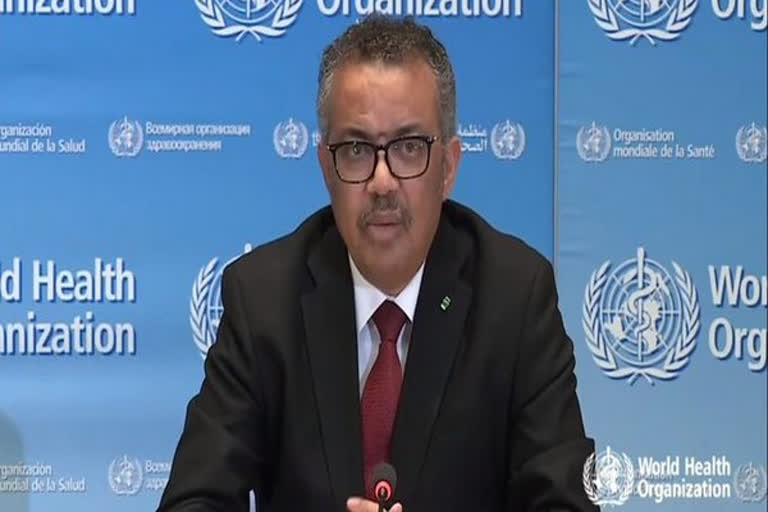Covid-19 pandemic long way from over, warns WHO chief
Tedros Adhanom Ghebreyesus, director-general of the World Health Organization, said on Monday adding that the coronavirus pandemic is 'long from over'. He again emphasised the public health measures of wearing masks, maintaining social distancing, testing, contact tracing, tracking and isolation.

Geneva: There have been now seven consecutive weeks of increasing Covid-19 cases and four weeks of increasing deaths globally, Tedros Adhanom Ghebreyesus, director-general of the World Health Organization, said on Monday adding that the coronavirus pandemic is 'long from over'.
"In January and February, the world saw six consecutive weeks of declining cases. We have now seen seven consecutive weeks of increasing cases, and four weeks of increasing deaths. Last week was the fourth-highest number of cases in a single week so far," Tedros said during the briefing.
The WHO chief noted that several countries in Asia and the Middle East have seen large increases in cases. This is despite the fact that more than 780 million doses of vaccine have now been administered globally, he said. He again emphasised the public health measures of wearing masks, maintaining social distancing, testing, contact tracing, tracking and isolation.
-
"The #COVID19 pandemic is a long way from over. But we have many reasons for optimism.
— World Health Organization (WHO) (@WHO) April 12, 2021 " class="align-text-top noRightClick twitterSection" data="
The decline in cases and deaths during the first two months of the year shows that this virus and its variants can be stopped"-@DrTedros
">"The #COVID19 pandemic is a long way from over. But we have many reasons for optimism.
— World Health Organization (WHO) (@WHO) April 12, 2021
The decline in cases and deaths during the first two months of the year shows that this virus and its variants can be stopped"-@DrTedros"The #COVID19 pandemic is a long way from over. But we have many reasons for optimism.
— World Health Organization (WHO) (@WHO) April 12, 2021
The decline in cases and deaths during the first two months of the year shows that this virus and its variants can be stopped"-@DrTedros
"Make no mistake, vaccines are a vital and powerful tool. But they are not the only tool. We say this day after day, week after week. And we will keep saying it. Physical distancing works. Masks work. Hand hygiene works. Ventilation works. Surveillance, testing, contact tracing, isolation, supportive quarantine and compassionate care - they all work to stop infections and save lives," he said.
He added, "But confusion, complacency and inconsistency in public health measures and their application are driving transmission and costing lives." While citing "many countries around the world" have shown that this virus can be stopped and contained with proven public health measures and strong systems that respond rapidly and consistently, Tedros said that the global body "does not warrant endless lockdowns".
Read: Russia hopes for early approval of Sputnik V vaccines in India
He said, "Many of those countries have gained control over COVID-19, and their people are now able to enjoy sporting events, concerts, restaurants and seeing their family and friends safely... WHO does not want endless lockdowns. The countries that have done best have taken a tailored, measured, agile and evidence-based combination of measures."
"We too want to see societies and economies reopening, and travel and trade resuming. But right now, intensive care units in many countries are overflowing and people are dying - and it is totally avoidable," the chief added. Tedros stated that the coronavirus pandemic is a long way from over. However, he said that the world has many reasons for optimism.
"This pandemic is a long way from over. But we have many reasons for optimism... The decline in cases and deaths during the first two months of the year shows that this virus and its variants can be stopped. With a concerted effort to apply public health measures alongside equitable vaccination, we could bring this pandemic under control in a matter of months," he said.
The death toll from the coronavirus infection in the world topped 2.94 million, almost 136.3 million cases of infection were detected, according to the US-based Johns Hopkins University.
(ANI)
Also Read: WHO laments 'shocking imbalance' in COVID-19 shot distribution






